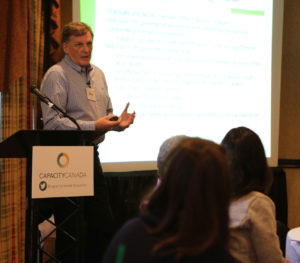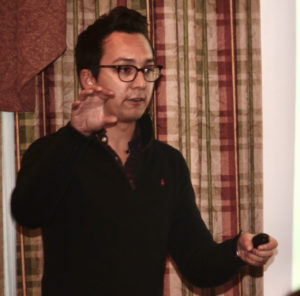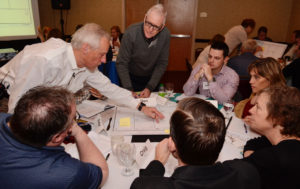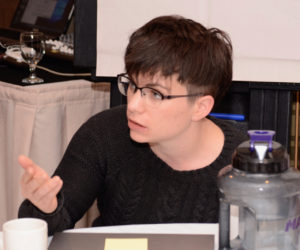|
Getting your Trinity Audio player ready...
|
After spending two days at Capacity’s Canada’s Manulife Board Governance BootCamp, David Barth has some serious unpacking to do.
The BootCamp doesn’t skimp on material.
“There are lots of different tools here and you have to be careful not to try to address them all at once,” said Barth, the executive director of World Accord. “You can’t climb the mountain in one time.”
For starters, he’s thinking about trying out the self-analysis the BootCamps encourage boards to do to review priorities and check in on objectives.

Held Nov. 17-19 in Kitchener, the BootCamp attracted nearly 50 participants from 19 organizations — the largest cohort in Waterloo Region since Capacity began hosting the annual BootCamp in 2009.
It was clear from the opening-night reception Nov. 17 that BootCamp attendees had set high expectations, and had no intention of being passive participants, said Cathy Brothers, Capacity’s executive director.
“In all my years working within non-profits,” Brothers said after the BootCamp, “I have never witnessed so many leaders from so many diverse organizations, genuinely encouraging and supporting each other as they tackled complex issues.”
In the past year, Capacity has brought its Governance BootCamp program to Fort McMurray, Alta., St. John’s, N-L., and Hamilton, Ont.
Different locations, same objective: strengthen non-profit organizations in the charitable sector by helping board directors and top administrators fully understand their distinct but complementary roles.
The days when boards were folksy, casual decision-making bodies have long gone, said Don McCreesh, a member of the BootCamp’s governance faculty. Funders, the public and the media have high expectations for transparency and accountability.
People “don’t want their money associated with something that could go wrong,” he said.
So boards must establish trustworthy processes for themselves, McCreesh said, and review them from to time to time to make sure those processes keep pace with changing conditions.
Among other things, boards should:
• Map out the areas of risk in what the organization does, and assess the organization’s tolerance for new risk;
• Regularly review the performance of the organization’s executive director;
• Take responsibility for building the agenda for board meetings, but seek input from the executive director;
• Fill vacant board seats through a recruitment process that continuously scans for potential candidates;
• Create metrics, the means by which an organization measures how will it is living up to its mission.
While executive directors and staff look after day-to-day operations, McCreesh said, boards should stick to the higher-elevation responsibilities of policy-making and strategic planning, and follow the principle of noses in, fingers out.
Not that charitable non-profits shouldn’t stretch their boundaries from time to time.

“Just do things, but don’t be reckless about this,” said Brett Chang who wrapped the BootCamp’s first full day. “Do things that make sense for your organization. Don’t be afraid.”
Chang, a public policy associate for ride-sharing venture Uber, encouraged non-profits to test new ideas, embrace failure as a learning tool and try another idea. Uber today, he said, grew out of early iterations that didn’t necessarily work well.
Capacity’s CapacityGo training app is the product of testing, tweaking and more tweaking. BootCamp participants get it to reinforce the what they learn from McCreesh and fellow BootCamp faculty members Ruth Cruikshank, Fred Galloway and Steve Farlow.
CapacityGo users receive short bursts of training on their computers or smartphones. Gamification throws in some friendly competition. It’s designed by Axonify, a Waterloo-based business that develops e-learning programs accessed on mobile devices and computers.
“There is just incredible knowledge retention on this platform,” Capacity’s Dan Weber told the group as day two began Saturday.
Besides figuring out where their risks lie, and whether there is an appetite for more, boards and administrations of non-profits need to determine what “win” looks like, Cruikshank said as she led the group in a session on strategy.

Organizations, she added, have to define their “unique positioning” that sets them apart from others working in the same field.
Drafting a business-model canvas might help, Farlow said. It’s a quick sketch of an organization’s strengths, weaknesses and objectives. Business plans are deeper, longer studies, and somewhat outdated, he added.
“Business plans are static,” Farlow said. “They aren’t meant for the uncertain environment we live and work in today.”
The BootCamp closed with situational studies on three Waterloo organizations that know a thing or two about change and uncertainty.
Lyndsey Butcher, executive director at SHORE (Sexual Health Options, Resources and Education) Centre, talked about how the organization rebranded from Planned Parenthood Waterloo Region. Since the launch of the new brand in April, SHORE has taken on 55 percent more clients.
Not long after dealing with a funding cut, Reception House Waterloo Region had to ramp up and welcome refugees from Syria. The organization got money to do the job, but timelines were extremely tight, said Carl Cadogan, executive director at Reception House.

The Independent Living Centre of Waterloo Region experienced some bumps as it searched for a new executive director to fill a two-year-old vacancy. If the recruitment process doesn’t attract candidates with the right fit, “don’t be afraid to step back, regroup and start over again,” said Sharron Garrah, the centre’s board chair.
BootCamp participants always leave with homework. They apply their new skills to something happening within their own organizations, then report back at graduation. This cohort reconvenes March 9.
Meanwhile, Carrie McNabb wants to see how what was said measuring and metrics might work on her board.
“I’ve already been able to take away a lot,” said McNabb, treasurer for SHORE Centre. “I can already think of actionable things that we can start adding to our meetings and overall governance. It’s been a really good experience.”


